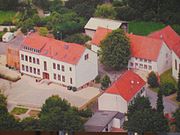School camp
A school campground in Germany is a supplementary learning location where students and teachers can work in depth on curriculum-related content in the form of project weeks for one to three weeks. School camps are educational institutions that complement the school , in which education and instruction take place in a special form. School country homes are to be distinguished from country school or country education homes , which represent their own full-time school systems and are usually run as boarding schools .
Destinations

A stay in a school camp is an offer for classes of all types of schools and of all ages. In addition, school camps are also available to all other school groups, such as courses, work groups, sports groups, student councils.
Learning and life should be experienced here as a unit without the organizational constraints of the school and, overall, have an invigorating effect on the social conditions and the learning climate in the classes .
Educational concept
School camps are often located in natural surroundings. Depending on their location and equipment, they have different profiles. On such a school trip often takes subjects interdisciplinary teaching instead holistic relationships with accommodation. There is more time for discussions. Experiences in group situations, experiences and social services are intended to raise awareness of the new and unusual. You can get to know the strengths and weaknesses of others. A better relationship among the students and with the teachers is a goal. The stays also offer the opportunity to get to know the region - landscape, nature, culture, economy and people.
The stay in a school camp is a “special educational situation”. Due to the size of a country home, it is also possible to meet different classes and ages across the region.
history
The first school camps emerged as part of the youth movement and reform pedagogy before the First World War . The inauguration of the Junghorst house on October 1, 1913 in Hoisdorf near Hamburg is considered to be the beginning of the school campus education .
The movement had its heyday in the years 1925 to 1933. Rudolf Nicolai organized the school camp movement in general and created the school camp Jöhstadt . The Realgymnasium Annaberg used this since 1923 . In addition, Nicolai headed the school camps section in the Saxon Philologists Association and the Saxon school camps working group. At the conference on “Das Landheim”, organized in October 1925 by the Berlin Central Institute for Education and Teaching , he gave the main lecture on the balance sheet of the school campus movement. At the same time, the school camps were merged into the Reichsbund der Deutschen Schullandheime eV, whose first chairman Nicolai was elected. He joined the NSDAP in May 1933 . While the Reichsbund had dissolved itself in 1934, he was still able to exercise his honorary position as department head for the school camps until October 1935.
The Nazis tried to collect what was only partially successful, the movement for its own purposes. In 1939 there were 378 school camps in the German Reich. The Second World War led to a slump, combined with extensive misuse. When the Federal Republic of Germany was founded, there were only around 110 locations in its territory. Their number rose to 360 by 1975 as part of the reconstruction.
In the Verband Deutscher Schullandheime e. V. currently around 250 school camps are organized. In addition, the association represents their interests in economic, legal and educational terms. It has 13 regional associations and is a member of the Paritätischer Wohlfahrtsverband .
The association has developed a "quality guide" which defines all the criteria for an optimal school campus operation in detail. School camps can use this guide to undergo certification that attests to the quality of the institution being tested. The certification is intended to give educators an overview when choosing a high-quality school campground.
Every year over 1.2 million pupils travel to the school camps during school / teaching time. School camps are a special form of multi-day school / class trips and are part of the educational mandate of the school.
More functions
Further training courses take place in school camps, for example to prepare school trips to such a home. Pedagogical concepts with advice are also offered.
In addition, school country homes are often occupied by extracurricular groups and associations, especially on weekends and during the holiday periods, e.g. B. of children / youth or sports and music groups, kindergartens and after-school care centers, self-help groups and church groups.
There are also seminars on political and ecological education as well as international encounters in the school camps. Last but not least, family camps as well as educational and advanced training events can take place in school camps.
literature
- Pedagogy in the school camp, published by the Association of German School camps , Regensburg 1975
See also
Web links
Individual evidence
- ↑ Gerhard Kochansky: Theory of School - Theory of the Schullandheimes , in: Pädagogik im Schullandheim , Regensburg 1975, pp. 109-148
- ↑ Klaus Kruse: History of the Schullandheim movement , in: Pädagogik im Schullandheim, Regensburg 1975, pages 11-106
- ^ Klaus Kruse: History of the Schullandheim movement , in: Pädagogik im Schullandheim, Regensburg 1975, page 21
- ↑ Andreas Pehnke: Biography of Rudolf Nicolai. In: Saxon Biography. Institute for Saxon History and Folklore, accessed on July 22, 2019 .




